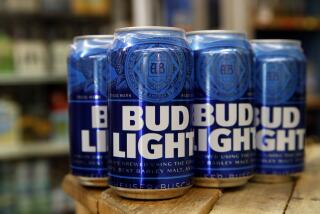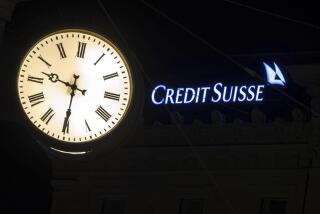Budweiser gets a new nationality
Red, white and blue Budweiser brewer Anheuser-Busch Cos. lost its battle for independence early Monday but it may be headed for barrels of new customers overseas.
The St. Louis-based beer maker agreed to be purchased by InBev of Belgium in a $52-billion merger that will create the world’s largest brewer to be called Anheuser-Busch InBev.
The deal is the latest move in the ongoing globalization of beer and the end of a 150-year-old company as American as Chevrolet.
“The King of Beers will have to pledge allegiance to a new European-Latin American master,” said British trade publication Just-Drinks.
And although its new owners will surely push Anheuser-Busch brands deeper into global markets, they also are likely to ride herd on expenses such as the famous Budweiser Clydesdales advertising campaign, according to industry observers. Anheuser spent an estimated $378 million on advertising in the U.S. last year.
“InBev is run by Brazilians who have been aggressive in cost cutting,” said Tom Pirko, president of Bevmark, a consulting firm in Buellton, Calif. “They will install the kind of discipline that will change the profile” of Anheuser-Busch.
InBev President Carlos Brito, who is based in Brazil, is “a tough guy,” Pirko said, and may cut back on Anheuser-Busch’s historically prolific advertising, curb its generous sponsorships and put the squeeze on distributors to reduce their profits.
Brito, however, said Monday that InBev had no plans to trim advertising in the United States.
“What we see in Anheuser-Busch is its marketing expertise, and that’s one of the pillars of why they built such great brands,” Brito said.
InBev said Monday that all of Anheuser-Busch’s U.S. breweries would remain open.
“We expect limited impact on the breweries as a result of the transaction,” InBev spokeswoman Nina Devlin said.
But union officials are wary. “We know that Carlos Brito has a reputation as a cost slasher, and always at the expense of workers,” said Jack Cipriani, a Teamsters official.
Pirko predicted that InBev would actually lower its beer prices in the United States for about the next year to try to build goodwill and reassure its longtime drinkers. Then, “as things begin to stabilize we will see prices go up and less selection of product.”
The sale will probably have little effect in places where beer is served, said Kip Snider, corporate beverage director of Yard House, a restaurant chain based in Irvine that has poured 3.9 million pints of beer so far this year.
The average Yard House has 110 beer brands on tap and Bud Light is the No. 2 seller behind Blue Moon, a Belgian-style wheat ale.
Anheuser-Busch beers and InBev beers have been delivered by the same distributors for the last year and a half, Snider said. “They’re already together as one in the distribution network.”
The merger is part of a long industry trend of consolidation, said Charlie Bamforth, chairman of the Food Science and Technology Department at UC Davis. He also holds a “professor of brewing science” chair endowed by Anheuser-Busch.
None of Britain’s six big brewing companies survived a wave of mergers in the late 1980s and early 1990s and the global market continues to favor giant companies because of their vast distribution networks and economies of scale, he said.
“Big companies are getting bigger and bigger,” said Bamforth after a two-Budweiser lunch.
“I worry about what that means for choice, variety and selection. It’s a good thing that in the USA there is a healthy craft beer segment to ensure diversity will continue.”
InBev said in a statement Monday that Budweiser together with InBev’s Stella Artois and Beck’s would become the combined company’s leading global brands by leveraging InBev’s expansive international footprint. St. Louis will be the headquarters for the company’s North American region.
Changes in Budweiser’s world won’t mean much to beer drinkers like microbrew fan David Kullmann, though. “I think Bud is really bland,” said the 23-year-old manager at a Los Angeles tech company. “The only time I have it is when there is nothing else and somebody else brings it.”
Anheuser-Busch shares rose 26% after reports of InBev’s planned bid in May. They gained $5.29, or 8.6%, on Friday and closed up 37 cents at $66.87 on Monday.
--
More to Read
Inside the business of entertainment
The Wide Shot brings you news, analysis and insights on everything from streaming wars to production — and what it all means for the future.
You may occasionally receive promotional content from the Los Angeles Times.










